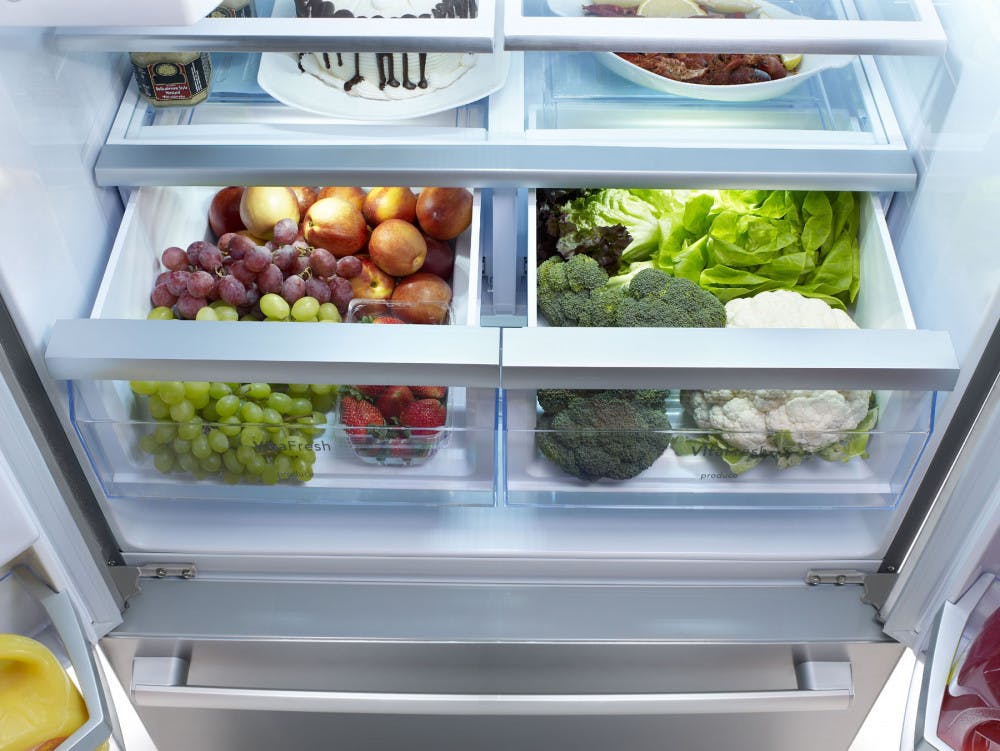Your weekly trip to the grocery store may include fanciful ideas of clean eating and a shopping cart barreled of fresh produce. Fast-forward seven days later, and do you see wilted vegetables and moldy fruits? As an idealistic shopper, we can get carried away with the variety of produce and forget that living foods have a dooming death sentence. As a conscious consumer, it’s important to be realistic with how much you’re likely to eat for the week. Your wallet will also appreciate your conservative efforts! Another solution is to prolong the expiration date of your foods with proper storage.
The simplest and most important tips for produce storage are:
- Keep vegetables that are stored outside the refrigerator away from sunlight. This prolongs the ripening process and gives you more time before you indulge!
- To add crispness to limp veggies, place the stems in a jar of distilled, room-temperature water
- Don’t wash fruits and vegetables until you are ready to eat them!
- Store salad greens in a bowl covered with a plastic wrap. Add a paper towel to help absorb moisture. The cause wilting leaves is moisture.
The list below includes more specific storage tips and an estimated shelf life for the most common fruits and vegetables.
Artichokes – place in a sealed container with light moisture. You can use a damp paper towel to place inside the container to help absorb excess moisture. Usually lasts up to seven days.
Asparagus –First, cut the bottom part of the stems off. Place them upright in a mason jar with room-temperature water. Cover the tips with a Ziploc. Usually lasts 3-4 days.
Avocados – place in a paper bag a room temperature. To speed the ripening process, throw in an apple into the bag. To prevent further ripening, place ready avocados in the fridge until ready for consumption When storing a chopped avocado or guacamole, leave the pit in, spritz with some olive oil and cover with plastic wrap. This will help prevent it from turning brown. Whole avocados last 3-5 days on kitchen counter.
Apples – store on the kitchen counter or shelf for a little less than a week. For longer storage of 3-4 weeks, apples can be should be placed in a brown paper bag in the fridge.
Apricots – can be stored on the kitchen counter at room temperature. If fully ripe, the refrigerator can prolong their shelf life. On countertop, usually lasts 1-3 days. Refrigeration can extend life to about four days.
Arugula – Place in dry open container, wrapped in a dry towel to absorb any extra moisture. If they came pre-washed in a plastic bag, dry them immediately. Arugula usually lasts 2-3 days.
Bananas – stored on the kitchen counter; place plastic wrapping around them to prolong the ripening process. Also, set them away from other produce, as they produce ethylene gases, which accelerate ripening. Lasts 2-3 days on countertop and can be placed in the refrigerator to extend life from 5-7 days.
Basil – Does not respond well to cold temperatures or wetness. The best option is to pack the leaves in an airtight container with a small damp piece of paper towel. The jar or container can be left on the kitchen counter. Lasts 7-10 days.
Berries – a brown paper bag works well in the refrigerator.
Broccoli/ Cauliflower – wrap around a damp towel and place in an sealed container in the fridge. Tends to live 3-5 days.
Cabbage – left out on the kitchen counter is fine for up to a week. For longer periods, leave the cabbage in the refrigerator crisper. Cabbage can last a few weeks because of its low rate of respiration. Lasts about one week.
Carrots – place them in a closed container wrapped in a damp towel. You can also place carrots and celery in a bowl filled halfway with water. Makes for a quickly accessible snack as well! Carrots tend to live three weeks, and celery lasts from 1-2 weeks.
Cherries – store in an airtight container. Do not wash until ready to eat, as moisture will induce mold. Last 4-7 days in the refrigerator.
Corn – leave un-husked in an open container. Lasts 1-2 days.
Cucumber – wrapped in a moist towel in the fridge. They can be left out at room temperature if you plan to eat them within a day or two. A whole cucumber will last about a week in the refrigerator.
Dates – can be left on the kitchen counter in the bag that they were bought. Last 1-2 months.
Garlic – store in a cool, dark place, like a pantry or kitchen cabinet. Can last up to four months.
Greens – study greens, such as kale, collards and chard, should be kept in an airtight container with a damp cloth to keep them from drying out. Remember to remove any bands or twist ties. Kale lasts around 5-7 days.
Green beans – A damp cloth can be draped over them in an open container. Try to keep the cloth from soaking the beans, as they like humidity but not wetness. Can last from 3-5 days.
Herbs - a closed container in the fridge will keep them lasting for up to a week. You can also store them in a jar filled partially with water to extend life even further. Can last from 7-10 days.
Lettuce – romaine, for example; keep with a dry cloth to absorb moisture in an airtight container. Romaine lettuce lasts about one week in the refrigerator.
Melons – uncut melons should be kept in a cool, dry place. If cut, place them in the fridge in an open container. Last around 2-4 at room temperature.
Mushrooms – store in a brown paper bag in the refrigerator; avoid plastic and never soak them in water. If they are dirty, a quick rinse will suffice. Last around 4-7 days.
Onions – store in a dark and dry place at room temperature. Last around 3-4 months.
Peaches – kitchen counter is fine; refrigerate only when completely ripe and will extend life to 3-5 days.
Pears – will keep for a few weeks in a paper bag on the kitchen counter. Lasts 1-4 days or until ripe.
Pomegranates – keep for up to a month on the kitchen counter. Lasts 1-2 weeks. If stored in the refrigerator, pomegranates can last from 1-2 months.
Potatoes/ Sweet potatoes – similar to garlic and onions, should be stored in a dark and dry place, such as a pantry or kitchen cabinet. Paper bags work well. Potatoes are long-lasting vegetables and can be stored up to 3-4 months.
Spinach – store in an open container in the coolest section of your fridge. Lasts 3-5 days.
Strawberries – do not like moisture. Place them in a paper bag in the fridge for up to a week. Last 2-3 days.
Sweet peppers – Keep dry and cool. Does not need a container. Only wash when ready to be eaten. Lasts 1-2 weeks.
Tomatoes –Once cut, they can be placed in the fridge. Can be stored in paper bags as well, but avoid plastic, which causes them to spoil faster. Last 3-4 days at room temperature.
For information on the shelf life of other produce, check out the site Still Tasty, which also has an iPhone app.






